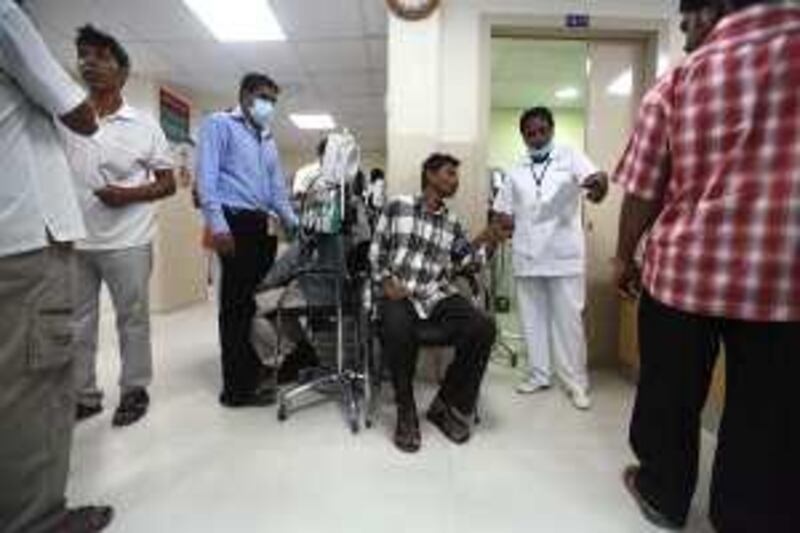As one looks further down the income scale, the gap becomes clear - people who earn the least are most likely to have stopped or cut back on spending on their own health care. For workers earning less than Dh45,000 (US$12,000) a year, more than half (51 per cent) are in that position, cutting back or stopping spending on both prescription and over-the-counter medicines.
Meanwhile, of those in the top income bracket, earning more than Dh250,000 a year, just 23 per cent say they have cut or stopped their spending on prescription medicines, and 26 per cent on over-the-counter drugs. Ruch de Silva, a health care consulting analyst with Datamonitor, which conducted a study of 305 men and women across the country, says that the high price of drugs in the UAE. The World Health Organisation found last year that medicines cost 23 times more than the international recommended prices.
"During a recession like this, people would tighten their belts in general and cut down on some components of their lifestyle," said Mr de Silva. "But the worrying thing for everyone, not just the country but to employers as well, is that people are making cutbacks on their health care, which means, if they get really ill in the long run, someone will end up having to pay, because they will either not turn up for work, or their family will suffer, or complications will set in as in the case of diabetic patients."
At Sahar Pharmacy in Dubai's Al Baraha area, however, pharmacist Unni Krishnan, from India, said that the effects of the recession could be clearly felt. "We are definitely selling much less than usual," said Mr Krishnan. "This area is a poorer area, there are a lot of workers here, and they buy over the counter medicines for things like cold, fever, headaches, cheap solutions for their health problems, but sales are still less," he said.
Mr Krishnan also said that the number of patients coming in with prescriptions had declined. "Everyone wants to save money now, we can see that definitely. People even ask us for a cheaper alternative to whatever medicine they need." Ahmad Yehia, a pharmacist from Egypt working in Al Yamama pharmacy in Sharjah, also painted a bleak picture. "Some regulars who have been coming here for years to get their medication - like diabetics who use Glucophage or patients with high blood pressure who buy Atacand, or even the cholesterol patients who need Lipitor - are not coming as often," said Mr Yehia. "Maybe they are not taking their medication daily to make it last."
Mr de Silva said pharmaceutical companies should acknowledge that they had a social responsibility to improve the accessibility of drugs to people of different incomes. "Sanofi Aventis, for example, have spoken about a pricing policy for different income levels," said Mr de Silva. "How they will execute this remains to be seen, but having certain types of drugs cheaper in certain countries and maybe to certain people as well could be a solution."
This would require guidance from regulators like the Ministry of Health and the health authorities, Mr de Silva said. Otherwise, people would continue to look into other ways of cutting costs, either through splitting their pills, missing their medication, avoiding physicians, or relying on the internet and alternative medicine. Dr Khaliq Raza Khan, a general surgeon from Pakistan in the Ismail Medical Centre in Dubai, usually treats low-income patients. He was recently treating workers at a labourers' clinic in Al Quoz industrial area.
"The workers ask me to prescribe them cheap medicine, some beg me not to take money from them because they cannot afford the Dh20 or Dh30 of the consultation anymore," said Dr Khan. "Some even share the same antibiotic for different infections in order to save money." Omeir Ahmed, 43, a taxi driver in Dubai, said although he had basic insurance, he would still rather spend money on food and rent, or send it to his family in Pakistan, than on medication or doctor visits.
Lydia Peridakis from Australia, 35, is a mother of two whose husband was laid off last September. She said that until her husband found employment in November, finances were tight for her family, who live in Sharjah. "Of course we automatically started thinking of ways to save money," she said. "We did big things like cancel a family holiday and put off purchasing a second car, but we also did little things like cut back on some pharmaceutical expenses, at least for myself and my husband.
"Even if we had stayed unemployed and didn't have insurance, we would still pay to see a doctor if the kids needed it," she said. @Email:hkhalaf@thenational.ae





